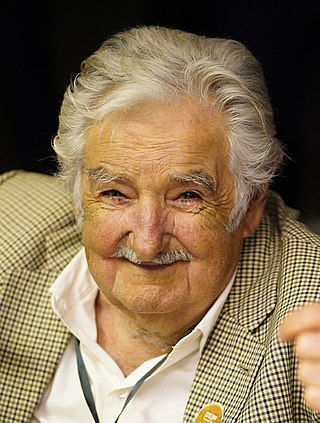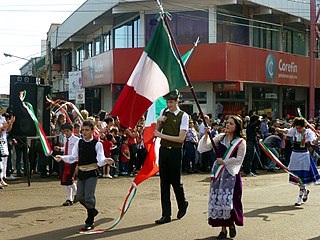Related Research Articles

Uruguay, officially the Oriental Republic of Uruguay, is a country in South America. It shares borders with Argentina to its west and southwest and Brazil to its north and northeast, while bordering the Río de la Plata to the south and the Atlantic Ocean to the southeast. It is part of the Southern Cone region of South America. Uruguay covers an area of approximately 176,215 square kilometres (68,037 sq mi). It has a population of around 3.4 million, of whom nearly 2 million live in the metropolitan area of its capital and largest city, Montevideo.

Telesur is a Latin American terrestrial and satellite news television network headquartered in Caracas, Venezuela and sponsored by the governments of Venezuela, Cuba and Nicaragua.

Miranda! is an Argentine electropop band formed in Buenos Aires in 2001. Original band members include Alejandro Sergi, Juliana Gattas, Lolo Fuentes (guitar), Bruno de Vincenti (programming), and Nicolás Grimaldi (bass). It is currently a duo between Sergi and Gattas.

José Alberto "Pepe" Mujica Cordano is a Uruguayan politician, former revolutionary and farmer who served as the 40th president of Uruguay from 2010 to 2015. A former guerrilla with the Tupamaros, he was tortured and imprisoned for 14 years during the military dictatorship in the 1970s and 1980s. A member of the Broad Front coalition of left-wing parties, Mujica was Minister of Livestock, Agriculture, and Fisheries from 2005 to 2008 and a Senator afterwards. As the candidate of the Broad Front, he won the 2009 presidential election and took office as president on 1 March 2010. He was the Second Gentleman of Uruguay from 13 September 2017 to 1 March 2020, when his wife Lucia Topolansky was vice president under his immediate predecessor and successor, Tabaré Vázquez.

Mauricio Macri is an Argentine businessman and politician who served as the President of Argentina from 2015 to 2019. He has been the leader of the Republican Proposal (PRO) party since its founding in 2005. He previously served as 5th Chief of Government of Buenos Aires from 2007 to 2015, and was a member of the Chamber of Deputies representing Buenos Aires from 2005 to 2007. Ideologically, he identifies himself as a liberal and conservative on the Argentine centre-right.

Diana Beatriz Conti was an Argentine lawyer and politician. She was a member of the Argentine National Congress both as a National Deputy and as a Senator (2002–2005); she also served as Undersecretary of Human Rights in the administration of Fernando de la Rúa from 1999 to 2001 and as a member of the Council of Magistracy from 2006 to 2010, where she rose to prominence as a staunch supporter of President Cristina Fernández de Kirchner's judicial reform proposals.

Laura Ana "Tita" Merello was an Argentine film actress, tango dancer and singer of the Golden Age of Argentine Cinema (1940–1960). In her six decades in Argentine entertainment, at the time of her death, she had filmed over thirty movies, premiered twenty plays, had nine television appearances, completed three radio series and had had countless appearances in print media. She was one of the singers who emerged in the 1920s along with Azucena Maizani, Libertad Lamarque, Ada Falcón, and Rosita Quiroga, who created the female voices of tango. She was primarily remembered for the songs "Se dice de mí" and "La milonga y yo".

No Te Va Gustar, also known by their initials NTVG, is an Uruguayan rock band formed in 1994 in Montevideo. The group consists of lead vocalist and guitarist Emiliano Brancciari, bassist Guzmán Silveira, drummer Diego Bartaburu, trumpeter Martín Gil, trombonist Denis Ramos, tenor saxophonist Mauricio Ortiz, guitarist Pablo Coniberti and keyboardist Francisco Nasser. Considered as the most popular and international Uruguayan rock band, and one of the most recognized Latin American groups, No Te Va Gustar has released ten studio albums via Bizarro Records, four becoming a chart-topper in their native country.

Italian Argentines are Argentine-born citizens who are fully or partially of Italian descent, whose ancestors were Italians who emigrated to Argentina during the Italian diaspora, or Italian-born people in Argentina.
Arriba was a Spanish daily newspaper published in Madrid between 1935 and 1979. It was the official organ of the Falange, and also of the regime during the Franco rule in the country.

Carlos Andrés Sánchez Arcosa is a Uruguayan professional footballer who plays for Uruguay Montevideo. Mainly an attacking midfielder, he can also play as a right winger. Sánchez is often nicknamed as "Pato" ("Duck") in his native country Uruguay.
Travelgenio was a Spanish online travel agency created in 2010 by the Argentinean entrepreneur Mariano Pelizzari. The company also published a survey of trends and customer satisfaction in the air travel industry.

Italian Paraguayans are one of the most prominent ethnic group in Paraguay, consisting of Paraguayan-born citizens who are fully or partially of Italian descent, whose ancestors were Italians who emigrated to Paraguay during the Italian diaspora, or Italian-born people in Paraguay. Italian immigration to Paraguay has been one of the largest migration flows this South American country has received.
The system of orders, decorations and medals of Uruguay consists of both military and civilian honours presented by the authorities of Uruguay with the purpose of recognising and rewarding actions or services considered praiseworthy.

Gabriel Boric Font is a Chilean politician serving as the president of Chile since 11 March 2022. He previously served two four-year terms as a deputy in the Chamber of Deputies.

Gerardo González Valencia is a Mexican convicted drug lord and high-ranking member of the Jalisco New Generation Cartel (CJNG), a criminal group based in Jalisco. He is part of a clan that heads a CJNG money laundering branch known as Los Cuinis. He was responsible for coordinating international money laundering schemes by using shell companies to purchase assets in Latin America, Europe, and Asia. His wife Wendy Dalaithy Amaral Arévalo was reportedly working with him on this large money laundering scheme when the couple moved from Mexico to Uruguay in 2011.
The Constitutional Nationalist Party – Union for Integration and Resurgence, often known by the shortened name UNIR Constitutional Nationalist Party or simply UNIR Party, is a conservative political party in Argentina founded in 1982 by Alberto Asseff, a former member of the Radical Civic Union. It is currently part of the Juntos por el Cambio coalition, and Asseff sits in the Argentine Chamber of Deputies since 2019 representing Buenos Aires Province. For most of its history it has supported Peronist candidates and alliances.

The second presidency of Tabaré Vázquez began on 1 March 2015 when he was inaugurated as the 41st president of Uruguay. Vázquez, a member of the Broad Front Party took office following his victory over the National Party nominee Luis Lacalle Pou in the second round of the 2014 general election, thus granting another five years of leftist governments. This presidential term continued the policies established since the Broad Front came into power in 2005. Among the featured policies a National Caregiving System was established, also the Ibirapitá Plan was created to promote the introduction of technology to the elderly, the transgender people law and the authorization of the second pulp mill plant of multinational company UPM.

La Libertad Avanza is an Argentine political coalition, which originated in Buenos Aires. It has been described as far-right, with conservative and ultraconservative stances on social and cultural issues, and as right-wing libertarian or ultra-liberal on economic issues. Its first electoral participation was at the 2021 Argentine legislative election, obtaining the third place with 17% of the votes in the capital.
References
- ↑ La Ciudad tiene una web para denunciar a empleados "ñoquis" (in Spanish)
- ↑ Long, William R. (8 March 1992). "Argentina Struggles to Cut Huge Bureaucracy". Los Angeles Times . Retrieved 23 November 2015.
- 1 2 Uriel, Paula (22 December 2015). "Ñoquis en el Estado: hay 4 millones de empleados públicos, de los cuales entre el 5% y 7% serían "fantasma"". La Nación . Retrieved 22 December 2015.(in Spanish)
- ↑ Mancini, Pablo (12 March 2008). "Ñoquis digitales: el nuevo invento del Gobierno para financiar la militancia". Perfil . Retrieved 22 December 2015.(in Spanish)
- ↑ Prengaman, Peter (16 April 2015). "A leading candidate in Argentina would overhaul economy". Associated Press. Retrieved 23 November 2015.
- ↑ "Politics - The Argentina Independent | The Argentina Independent". The Argentina Independent . 13 June 2010. Retrieved 23 November 2015.